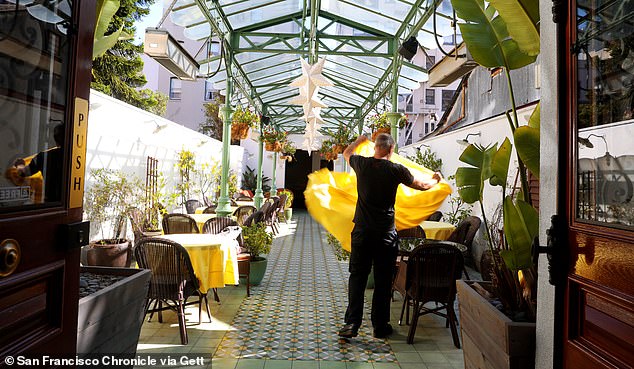Controversial Bay Area restaurant has abruptly shut – after being accused of racism
A ‘cancelled’ restaurant in San Francisco has closed for good.
Le Colonial, which had been open near Union Square since 1998, served its last customers on September 1.
The restaurant and the food are a tribute to Vietnam during the French occupation in the 1920s.
However, critics said the depictions of Vietnamese culture were gimmicky and played on stereotypes, and the decorations often featured items from other Southeast Asian countries.
It led to accusations that it celebrated colonialism, and Le Colonial was called racist in a now-infamous 2019 review by a San Francisco Chronicle restaurant critic
“We’ve basically been canceled, in a sense, with a lot of the local media,” said chef and general manager Geoffrey Deetz told the Chronicle this week.
Le Colonial, which had been open near Union Square since 1998, served its last customers on September 1

A clip from a video promoting the restaurant Le Colonial
“It was just too much to overcome, between that review years ago and Covid. It put us in a situation where we couldn’t dig it up anymore.”
He referred to a review of the restaurant in 2019 by the Chronicle’s then-food critic, Soleil Ho.
“The theme of Le Colonial is covered in a sticky layer of racism. This insult is further reinforced by the fact that the food is not well-executed or particularly exciting,” the text reads.
San Francisco is a city that is home to one of the largest Vietnamese populations outside the country.
Deetz and his wife Quynh Nhu, a pastry chef, took over Le Colonial in 2021 and were tasked with shaking up the restaurant’s questionable image.
In an interview at the time, The Chronicle described Deetz’s task, saying he “had to try to bring respect to perhaps San Francisco’s least ‘woke’ restaurant.”
“When I walked into the bathroom and saw Buddha, it was really unacceptable,” Nhu told the Chronicle in the interview.
‘Some of the paintings on the wall were beautiful, but others looked scary and just didn’t seem right.’
She told the publication that some of the photos, which depicted Vietnamese people in the 19th century, made her shudder.
“They may see a funny white guy cooking their food, but the passion that this restaurant is trying to convey is celebrating Vietnamese culture,” Deetz said in the 2021 interview.
“I want to create an environment where Vietnamese people can feel at home, in a place that used to be so offensive and alienating to modern America.”
Locals believe the couple improved the restaurant’s image, but that with the added challenges brought about by the pandemic, it was too late.
“It was just a tough battle,” Deetz concluded last week.
In general, restaurants in the US have struggled post-pandemic as they have had to deal with with higher food and labor costs. There have been a lot of closures and bankruptcies.

Geoffrey Deetz and his wife Quynh Nhu took over Le Colonial in 2021 and have done their best to shake off its questionable image

Le Colonial, which had been open near Union Square since 1998, served its last customers on September 1
Red Lobster was the largest company to file for bankruptcy, and the $20 worth of shrimp deal was cited as a factor.
Popular Italian restaurant Buca di Beppo filed for bankruptcy in August, just days after it abruptly closed 13 underperforming locations.
World of Beer Bar & Kitchen was named one of the fastest growing restaurant chains in the US in 2013.
In August, the company also filed for Chapter 11 bankruptcy, saying it still owed suppliers about $50 million.
National coffee and luxury supermarket chain Foxtrot announced in early April that it would be closing all of its stores with immediate effect, leaving staff and customers stunned.
Businesses are struggling with declining sales as Americans eat out less after two years of steep price increases.
